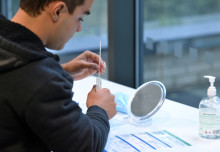

Research breakthrough could help those with chronic heart problems <em> - News Release </em>
See also
Related news stories
For Immediate Release
Wednesday 25 June 2008
An implantable sensor providing 24 hour monitoring for patients with chronic heart problems will be developed thanks to a new grant, scientists announce today.
Researchers from Imperial College London have received a £760,000 grant from the Wellcome Trust to develop a miniature sensor, smaller than a five pence piece, to monitor the hearts of people who have undergone heart operations or who have conditions that could lead to heart failure.
Currently, patients who have had heart operations or suffer from chronic heart conditions need to be regularly monitored in hospital to detect changes in their condition. This is time consuming and inconvenient for patients and costly for hospitals.
The reader device can be used by patients and doctors for heart readings
Scientists believe that their implantable sensor could improve heart monitoring by remotely providing a constant flow of information, enabling doctors to more accurately predict serious illnesses, improve the timing of operations to maximise their effectiveness and free the patient from regular visits to the hospital.
The sensor is constructed from silicon and vibrates at a rate which varies according to the pressure inside the heart. Once at home, patients would wear a reader, a miniature device that detects these vibrations through radio pulses, and translates them into precise measurements.
Patients would be able view their own readings at home via the reader, while doctors could take measurements by dialling up the reader via a mobile phone or by logging onto a secure internet site. The reader could also be set to automatically send alarms to the doctor if a patient’s heart reading reaches critical levels.
Lead researcher, Professor Christofer Toumazou, from Imperial College London’s Institute of Biomedical Engineering, says:
“The heart pressure sensor could transform the lives of people living with chronic heart problems and has the potential to revolutionise heart monitoring. At the touch of a few buttons a family doctor could dial up their patient’s heart history and plot pressure trends to better manage their condition and prevent the progression of heart failure.”
Sir Magdi Yacoub, Professor of Cardiothoracic Surgery at Imperial College London, has trialled the pressure sensor successfully on animal laboratory models. Sir Madgi added:
“This device is one of the most exciting developments during the last 20 years. Heart failure is currently reaching epidemic proportions in the UK and I think this sensor will have a major impact on the management of patients and will help to guide doctors when timing operations to maximise their benefits for patients.”
Researchers from the Institute of Biomedical Engineering including Sir Magdi Yacoub, Professor Chris Toumazou, Dr Olive Murphy, Dr Tony Vilches and Professor Chris McLeod are planning human trials for 2009.
Cardiovascular disease, including heart disease and stroke, is the main cause of death in the UK. In 2005 it accounted for about 4 out of every 10 deaths. Worldwide, 15 million people died from heart disease in 2005 (WHO).
-Ends-For further information please contact:
Colin Smith
Press Officer
Imperial College London
Email: cd.smith@imperial.ac.uk
Tel: +44 (0)207 594 6712
Out of hours duty press officer: +44 (0)7803 886 248
Notes to editors:
1. About Imperial College London
Imperial College London - rated the world's fifth best university in the 2007 Times Higher Education Supplement University Rankings - is a science-based institution with a reputation for excellence in teaching and research that attracts 12,000 students and 6,000 staff of the highest international quality.
Innovative research at the College explores the interface between science, medicine, engineering and business, delivering practical solutions that improve quality of life and the environment - underpinned by a dynamic enterprise culture. Website: www.imperial.ac.uk
Article text (excluding photos or graphics) available under an Attribution-NonCommercial-ShareAlike Creative Commons license.
Photos and graphics subject to third party copyright used with permission or © Imperial College London.





